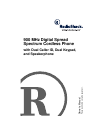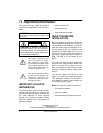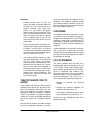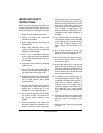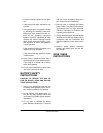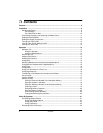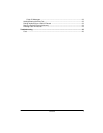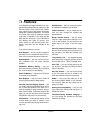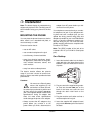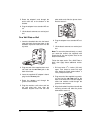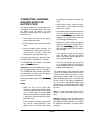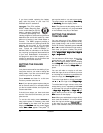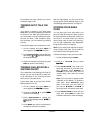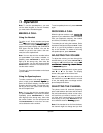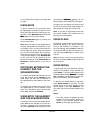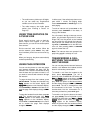
3
Important Information
Important:
• Cordless phones such as this one
require AC power to operate. When the
AC power is off, you cannot dial out or
receive incoming calls using your
phone. For this reason, the phone
should not be your only telephone. To be
safe, you should also have a phone that
does not require AC power to operate
(not a cordless phone) so you can still
make and receive calls if there is an AC
power failure.
• Some cordless phones operate at fre-
quencies that might cause interference
to nearby TVs and VCRs. To minimize
or prevent such interference, the base of
the cordless phone should not be placed
near or on top of a TV or VCR.
• Your cordless phone operates on stan-
dard radio frequencies, as allocated by
the FCC. Even though your phone's
access protection code prevents unau-
thorized use of your phone line, it is pos-
sible for other radio units operating on
similar frequencies within a certain area
to unintentionally intercept your conver-
sations and/or cause interference. This
possible lack of privacy can occur with
any cordless phone.
THE FCC WANTS YOU TO
KNOW
In the unlikely event that your phone causes
problems on the phone line, the phone com-
pany can temporarily discontinue your ser-
vice. If this happens, the phone company
attempts to notify you in advance. If advance
notice is not practical, the phone company
notifies you as soon as possible and advises
you of your right to file a complaint with the
FCC.
Also, the phone company can make changes
to its lines, equipment, operations, or proce-
dures that could affect the operation of this
telephone. The telephone company notifies
you of these changes in advance, so you can
take the necessary steps to prevent interrup-
tion of your telephone service.
LIGHTNING
Your telephone has built-in protection circuits
to reduce the risk of damage from surges in
telephone line and power line current. These
protection circuits meet or exceed the FCC
requirements. However, lightning striking the
telephone or power lines can damage your
telephone.
Lightning damage is not common. Neverthe-
less, if you live in an area that has severe
electrical storms, we suggest that you unplug
your phone when storms approach to reduce
the possibility of damage.
FCC STATEMENT
The phone complies with the limits for a
Class B digital device as specified in Part 15
of
FCC Rules
. These limits provide reason-
able protection against radio and TV interfer-
ence in a residential area. However, your
equipment might cause TV or radio interfer-
ence even when it is operating properly. To
eliminate interference, you can try one or
more of the following corrective measures:
• Reorient or relocate the receiving
antenna.
• Increase the distance between the
equipment and the radio or TV.
• Use outlets on different electrical circuits
for the equipment and the radio or TV.
Consult your local RadioShack store if the
problem still exists.



